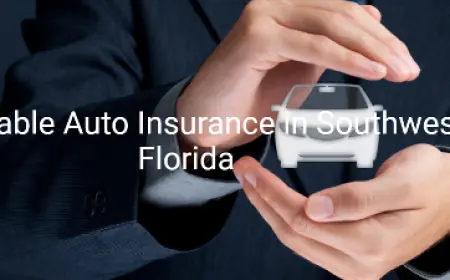How Can Auto Insurance Lower Risks For Delivery Teams?
Learn how auto insurance protects delivery teams, lowers risks, ensures vehicle and driver safety, and improves operational efficiency.

Delivery teams rely heavily on vehicles, making protection a priority. Auto insurance quotes in morrisville, nc help businesses safeguard drivers, vehicles, and cargo. The right coverage minimizes financial losses from accidents, theft, or liability claims while ensuring smooth operations. Insured teams can focus on timely deliveries without worrying about unforeseen incidents. Proper insurance also supports compliance with state regulations, offering peace of mind and strengthening business reliability.
Delivery Team Risks
Delivery teams face frequent exposure to accidents, vehicle damage, cargo loss, and third-party liability. Tight schedules and extensive driving increase the likelihood of incidents. Even minor accidents can disrupt operations and result in costly repairs or legal issues. Large and small delivery operations alike face financial strain from unexpected events. Recognizing these risks is the first step toward implementing measures that protect both assets and employees, maintaining consistent service levels.
Role of Auto Insurance in Risk Management
Auto insurance serves as a financial safety net for delivery businesses. Coverage protects against vehicle repairs, medical costs, liability, and cargo loss. With insurance, drivers can perform duties confidently, knowing that accidents or damages won’t derail business operations. This protection reduces the risk of unexpected expenses impacting the bottom line. By mitigating financial exposure, insurance allows companies to focus on service efficiency, fleet maintenance, and growth without the burden of potential liabilities.
Key Auto Insurance Benefits for Delivery Teams
-
Protection against vehicle damage and repair costs
-
Coverage for bodily injury or liability claims
-
Safeguarding against cargo theft or damage
-
Assistance with legal and medical expenses after accidents
-
Ensures compliance with state and federal regulations
Choosing the Right Coverage
Selecting suitable insurance requires evaluating vehicle types, driver experience, delivery areas, and trip frequency. Businesses must balance coverage levels with premium affordability. Comprehensive policies ensure protection against accidents, liability, and cargo damage. Tailored coverage also supports operational demands, such as multi-vehicle fleets or high-volume delivery schedules. Making informed choices reduces financial vulnerability, ensures compliance, and maintains uninterrupted service while providing optimal protection for drivers and assets.
How Insurance Encourages Safer Practices
Insurance providers promote safer driving through incentives like driver training programs, telematics monitoring, and performance-based discounts. These initiatives reduce accident frequency and foster accountability among drivers. Safer driving not only protects employees and cargo but also lowers insurance claims, which can decrease premiums over time. By integrating safety programs into fleet management, businesses create a culture of responsibility, improving operational efficiency while enhancing overall team performance and risk management practices.
Handling Claims Efficiently
Efficient claims management requires prompt reporting, accurate documentation, and clear communication with insurers. Timely action ensures faster settlements, reducing downtime and financial disruption. Properly handling claims minimizes the impact on daily operations and prevents prolonged revenue loss. Delivery businesses benefit from a structured claims process that maintains operational flow, supports driver safety, and preserves customer trust. Understanding insurer requirements and maintaining detailed records streamline resolutions and maintain fleet readiness.
Impact on Business Reputation
Maintaining proper insurance coverage signals professionalism and reliability to clients and partners. Insured fleets demonstrate a commitment to safety, responsibility, and compliance, fostering customer confidence. Businesses with strong insurance practices can secure long-term contracts, enhance partnerships, and stand out in competitive markets. A well-protected fleet shows that the company values employees, goods, and client relationships. This credibility reinforces brand reputation and contributes to sustainable business growth in delivery operations.
Cost Considerations and Savings
Insurance premiums can be managed by adopting safe driving practices, fleet monitoring, and bundling policies. Reducing accidents and claims helps lower immediate costs and improves future premium rates. Investing in comprehensive coverage ensures protection while providing financial stability. Long-term savings result from fewer repair costs, legal expenses, and downtime. Delivery companies that strategically manage insurance achieve predictable budgeting, safeguard assets, and maintain operational efficiency, making proper coverage a critical investment for sustained profitability.
Conclusion
Auto insurance reduces risks for delivery teams by offering financial protection, promoting safer driving, and supporting uninterrupted operations. Tailored policies protect vehicles, cargo, and drivers, ensuring businesses remain operational despite accidents or losses. Choosing the right coverage balances cost with adequate protection, supporting compliance and efficiency. Insured fleets gain credibility, client trust, and peace of mind, allowing companies to focus on service quality and growth while minimizing operational and financial risks.
FAQs
1. What types of auto insurance should delivery teams have?
Delivery teams require liability, collision, comprehensive, and cargo insurance to cover vehicles, drivers, and goods.
2. How does insurance lower operational risks?
It provides financial protection against accidents, damages, liability claims, and cargo loss, reducing business disruptions.
3. Can insurance savings be achieved through safer driving?
Yes, telematics monitoring and driver safety programs reduce accidents and claims, leading to lower premiums over time.
4. How does proper insurance affect client trust?
Insured fleets demonstrate reliability and responsibility, enhancing reputation and securing long-term contracts.
5. What should businesses consider when selecting coverage?
Vehicle type, trip frequency, delivery area, number of drivers, and budget are key factors for tailored insurance policies.
Visit: totalinsurancenc.com/auto-insurance
What's Your Reaction?
 Like
0
Like
0
 Dislike
0
Dislike
0
 Love
0
Love
0
 Funny
0
Funny
0
 Angry
0
Angry
0
 Sad
0
Sad
0
 Wow
0
Wow
0


















































